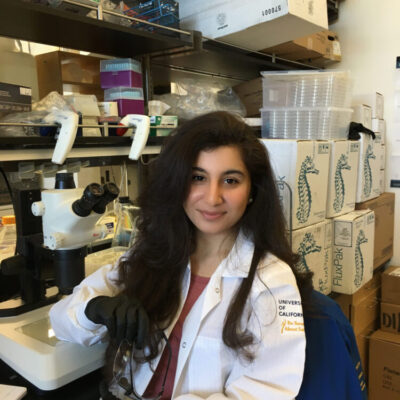Nazineen Kandahari L&S Sciences
Cell non-autonomous regulation of the unfolded protein response in aging
The epidemiology of disease is changing from acute to chronic. A majority of our research and public health efforts have been focused on eradicating infectious diseases when, in fact, chronic diseases are the leading causes of death worldwide. The mortality rate for chronic disease increases exponentially with age, and, with the increasingly aging population, chronic disease is a public health issue demanding urgent attention.
Chronic diseases, such as cancer, diabetes, and Alzheimers, result when the ability of an organism to maintain homeostasis diminishes. The unfolded protein response (UPR) is one of the multiple cellular stress response mechanisms responsible for alleviating protein damage accumulated through senescence and biological stressors such as pollution and pesticides. The molecular mechanisms of the UPR are not well understood. Through my research, I aim to explore the UPR in glial and neuronal cells. Using the genetically similar Caenorhabditis elegans nematode as my model organism, I will first investigate if it is possible to prolong lifespan by enhancing the UPR in these brain cells, and then characterize the genetic basis of cell non-autonomous signaling, a recently discovered intracellular communication mechanism of the UPR. My findings will refine our understanding of the UPR and potentially broaden the scope of pharmaceuticals that can be used to treat diseases of UPR dysfunction.
Message To Sponsor
Prior to UC Berkeley, I had minimal exposure to the field of research and did not have the academic and professional support to create a research career for myself. Now, I have the privilege and honor of working with the incredibly supportive and passionate team of scientists at Dillin Lab; my postdoctoral mentor, Dr. Ashley Frakes, and Principal Investigator, Dr. Andrew Dillin, humanize leadership in the field of science. I thank the Thye Foundation for funding my research this summer. Through the SURF program I am obtaining critical experience and support to excel in my future career in research.